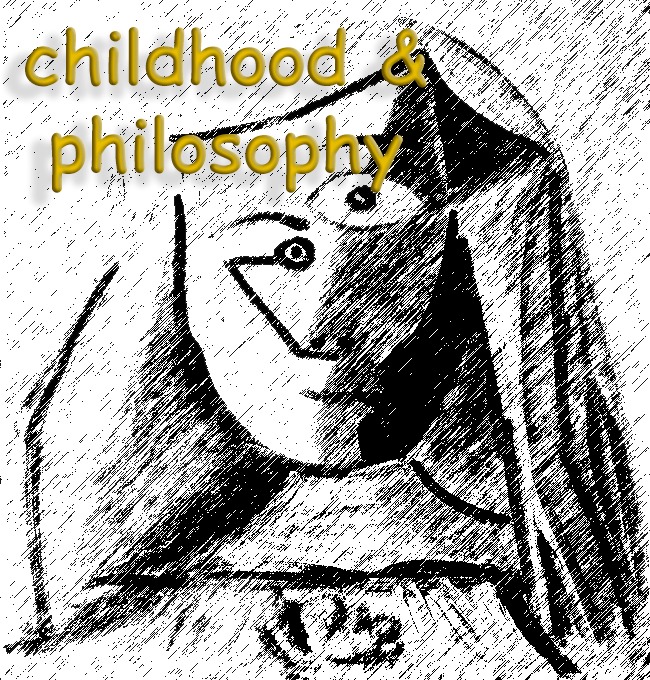the facilitator as liberator and enabler: ethical responsibility in communities of philosophical inquiry
DOI:
https://doi.org/10.12957/childphilo.2021.53450Parole chiave:
philosophy for/with children, self-liberated facilitator, enabling identity, pedagogy of fear, counter-education, diasporic educationAbstract
From its inception, philosophy for/with children (P4wC) has sought to promote philosophical discussion with children based on the latter’s own questions and a pedagogic method designed to encourage critical, creative, and caring thinking. Communities of inquiry can be plagued by power struggles prompted by diverse identities, however. These not always being highlighted in the literature or P4wC discourse, this article proposes a two-stage model for facilitators as part of their ethical responsibility. In the first phase, they should free themselves from assumptions and closed-mindedness. They should liberate themselves from pedagogy of fear and “banking education” in order to act freely in an educational space characterized by improvisation that cultivates participation of the children. Here, the text is based on normalizing education principles, counter-education and diasporic-education approaches in order to ensure openness and inclusiveness. In the second, they should embrace enabling-identity views and practices in order to make the community of inquiry as identity-broad and -rich as possible, recognizing and legitimizing the participants’ differences. Here, the text is based on principles such as recognizing power games as part of the community, ensuring multi-narratives human environment and enabling epistemic justice in order to ensure perspectival multiplicity, multiple identities, and the legitimization of difference characterized by pedagogy of search.
Downloads
Riferimenti bibliografici
Bauman, Z. (2000). Liquid modernity. Malden: Blackwell.
Canning, N., & Callan, S. (2010). Heutagogy: Spirals of reflection to empower learners in higher education. Reflective Practice, 11(1), pp. 71–82.
Cavarero, A. (2000). Relating narratives: Storytelling and selfhood. London/New York: Routledge.
English, A., & Stengel, B. (2010). Exploring fear: Rousseau, Dewey, and Freiere on fear and learning.” Educational Theory, 60(5), pp. 521–542.
Fanon, F. (1967). Black skin, white masks. Grove, New York, NY.
Foucault, M. (1980). Power/knowledge. Brighton: Harvester.
Freire, P. (1970). Pedagogy of the oppressed. New York: Herder & Herder.
Fricker, M. (2007). Epistemic injustice: Power and the ethics of knowing. Oxford: Oxford University Press.
Frost, A., & Yarrow, R. (2007). Improvisation in drama. London: Palgrave Macmillan.
Gates, H. L. (1995). “Thirteen ways of looking at a black man.” New Yorker, October 6, p. 57.
Gur-Ze’ev, I. (1999). Philosophy, politics and education in Israel. Haifa: University of Haifa/Zmora Bitan (Hebrew)
Gur-Ze’ev, I. (2004). Towards diasporic education: Multi-culturalism, post-colonialism and counter-education in a post-modern Era. Tel Aviv: Resling (Hebrew).
Gur-Ze’ev, I. (2010). Diasporic philosophy and counter-education. Rotterdam: Sense.
Kenyon, C., & Hase, S. (2010). “Andragogy and heutagogy in postgraduate work.” In T. Kerry (Ed.), Meeting the challenges of change in postgraduate education (pp. 167–178). London: Continuum.
Kizel, A. (2014). The New Mizrahi Narrative in Israel. Tel Aviv: Resling (Hebrew).
Kizel, A. (2016a). “Enabling identity: The challenge of presenting the silenced voices of repressed groups in philosophic communities of inquiry.” Journal of Philosophy in Schools, 3(1), pp. 16–39.
Kizel, A. (2016b). “Philosophy with children as an educational platform for self-determined learning.” Cogent Education, 3(1): https://doi.org/10.1080/2331186X.2016.1244026
Kizel, A. (2016c). Pedagogy out of fear of philosophy as a way of pathologizing children. Journal of Unschooling and Alternative Learning, 10(20), pp. 28–47.
Kizel, A. (2019). “Enabling identity as an ethical tension in community of philosophical inquiry with children and young adults”. Global Studies of Childhood, 9(2), pp. 145–155.
Lipman, M. (1991). Thinking in education. Cambridge: Cambridge University Press.
Lipman, M. (1997). “Philosophical discussion plans and exercises.” Critical and Creative Thinking, 5(1), pp. 1–17.
Lyotard, J. F. (1984). The postmodern condition: A report on knowledge. Manchester: Manchester University Press.
Mezirow, J. (1997). Transformative learning: Theory to practice. New Directions for Adult and Continuing Education, 74, pp. 5–12.
Murris, K. (2013). “The epistemic challenge of hearing child’s voice.” Studies in Philosophy and Education, 32(3), pp. 245–259.
Ndofirepi, A. P., & Cross, M. (2015). “Child’s voice, child’s right: Is Philosophy for Children in Africa the answer? Interchange, 46, pp. 225–238.
Riessman, K. C. (1993). Narrative analysis. Thousand Oaks: Sage.
Rousseau, J-J. (1762). Emile, or education. London/Toronto: E. P. Dutton & Co.
Sarbin, T. (1986). Narrative psychology: The storied nature of human conduct. New York: Praeger Britton.
Solis, J. (2004). “Narrating and counternarrating illegality as an identity.” In C. Daiute & C. Lightfoot (Eds.), Narrative analysis: Studying the development of individuals in society (pp. 181–199). Thousand Oaks: Sage.
Taylor, C. (1989). Sources of the self. Cambridge: Harvard University Press.



